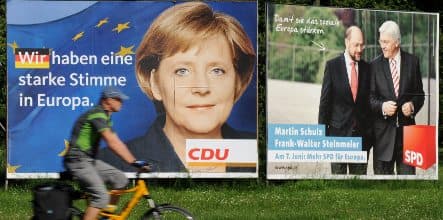Merkel urges Germans to vote in EU poll

Germans head to the polls on Sunday to elect representatives for a new European Parliament amid fears of a low voter turnout.
At a campaign rally in Heidelberg on Saturday, Chancellor Merkel pressed Germans to cast their votes and take a stance on the work done by the European Union.
The chancellor said that the lack of interest in the European Parliament elections may be because many Germans feel alienated from the European Union.
"To many citizens, the European institutions seem too remote. They often only find out about decisions made there when they are converted to national laws in Germany," she said.
More than 64 million Germans are eligible to vote in Sunday’s European elections. Among them are 2.1 million people from other EU countries and 4.6 million first-time voters.
But many fear a low voter turnout in an election marked by lacklustre campaigning, a lack of knowledge of what MEPs actually do and a lack of prominent candidates. In addition, local elections take place on Sunday in seven German states. During the last European elections five years ago, voter turnout in Germany reached a low of 43 percent.
Polls show Chancellor Angela Merkel’s conservative bloc ahead of the centre-left Social Democrats. Germany holds national elections in September and Merkel hopes to form a centre-right government after the national vote with the pro-business Free Democrats, whose ratings have surged during the recession.
On Saturday, Germany’s main parties ended campaigning for the European elections with an appeal to voters to cast their vote.
With its 99 seats, out of a total of 736, Germany has the largest contingent of MEPs in the European Parliament.
Roland Koch, deputy leader of Merkel’s Christian Democrats, told Welt am Sonntag that the European election results would be interpreted as a signal for the general elections in September.
But Dirk Niebel, general secretary of the Free Democrats, said voters were very capable of differentiating between national elections and European polls. “That’s why it’s probably a signal for how things will develop in this year but it’s certainly no foregone conclusion.”
European elections are taking place in all the EU’s 27 member states. The Netherlands and Britain were the first to vote on Thursday followed by Ireland, the Czech Republic and a host of other nations on Friday.
On Sunday, people in 18 other EU countries will be voting along with Germans. Some 375 million Europeans across the EU are eligible to vote in the election.
Comments
See Also
At a campaign rally in Heidelberg on Saturday, Chancellor Merkel pressed Germans to cast their votes and take a stance on the work done by the European Union.
The chancellor said that the lack of interest in the European Parliament elections may be because many Germans feel alienated from the European Union.
"To many citizens, the European institutions seem too remote. They often only find out about decisions made there when they are converted to national laws in Germany," she said.
More than 64 million Germans are eligible to vote in Sunday’s European elections. Among them are 2.1 million people from other EU countries and 4.6 million first-time voters.
But many fear a low voter turnout in an election marked by lacklustre campaigning, a lack of knowledge of what MEPs actually do and a lack of prominent candidates. In addition, local elections take place on Sunday in seven German states. During the last European elections five years ago, voter turnout in Germany reached a low of 43 percent.
Polls show Chancellor Angela Merkel’s conservative bloc ahead of the centre-left Social Democrats. Germany holds national elections in September and Merkel hopes to form a centre-right government after the national vote with the pro-business Free Democrats, whose ratings have surged during the recession.
On Saturday, Germany’s main parties ended campaigning for the European elections with an appeal to voters to cast their vote.
With its 99 seats, out of a total of 736, Germany has the largest contingent of MEPs in the European Parliament.
Roland Koch, deputy leader of Merkel’s Christian Democrats, told Welt am Sonntag that the European election results would be interpreted as a signal for the general elections in September.
But Dirk Niebel, general secretary of the Free Democrats, said voters were very capable of differentiating between national elections and European polls. “That’s why it’s probably a signal for how things will develop in this year but it’s certainly no foregone conclusion.”
European elections are taking place in all the EU’s 27 member states. The Netherlands and Britain were the first to vote on Thursday followed by Ireland, the Czech Republic and a host of other nations on Friday.
On Sunday, people in 18 other EU countries will be voting along with Germans. Some 375 million Europeans across the EU are eligible to vote in the election.
Join the conversation in our comments section below. Share your own views and experience and if you have a question or suggestion for our journalists then email us at [email protected].
Please keep comments civil, constructive and on topic – and make sure to read our terms of use before getting involved.
Please log in here to leave a comment.